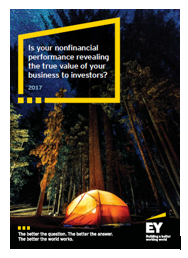
Against the backdrop of recent environmental and social scandals and a greater call for organizations to create long-term value, 82% of institutional investors say environmental, social and governance (ESG) risks have been ignored for too long by the business world. In addition, 81% of respondents say companies do not adequately disclose nonfinancial risks that could affect their business. This is according to the third EY Climate Change and Sustainability Services (CCaSS) survey of more than 320 global institutional investors’ attitudes to nonfinancial reporting: Is your nonfinancial performance revealing the true value of your business to investors?
Eighty-one percent of respondents say they now pay closer attention to nonfinancial disclosures as a result of recent noncompliance revelations of ESG expectations. Ninety-two percent agree that over the longer-term, ESG issues — ranging from climate change to diversity to board effectiveness — have tangible and quantifiable impacts. In fact, 89% agree that a sharp focus on ESG issues can generate sustainable returns over time.
Mathew Nelson, EY Global and Asia-Pacific Climate Change and Sustainability Services Leader, says:
“Recent corporate environmental and social scandals and a focus on longer-term value versus short-term dividend payouts are clearly pushing nonfinancial reporting up institutional investors’ agendas. This leads to a disconnect between investors who see ESG as having real and quantifiable financial impacts and companies that do not see ESG risks as core to their business.”
Impact on decision making
The survey finds that in the last 12 months, 68% of respondents said a company’s nonfinancial performance had played a pivotal role in their investment decisions, up from 58% in 2015. Sixty percent of institutional investors say that their clients are now demanding ESG information; however, 73% said they conduct only informal assessments or no review at all.
Fifty-nine percent said that in the absence of a direct link between ESG initiatives and business strategy to create value in the short, medium and long term they would reconsider investment. Fifty-eight percent of investors would reconsider investment following disclosure of risk or history of poor governance.
With the 2015 Paris Climate Conference (COP21) and other stewardship codes being introduced, the pressure on companies from investors to report more consistent and verifiable ESG information is going to increase, the survey finds. Fifty-eight percent of investors say they expect at least a moderate increase in disclosures of company climate practices and related risk management strategies, with a further 27% expecting dramatic improvements in this area.
Nelson says: “We know that climate change represents a significant economic shift following the Paris Agreement. Investors are growing impatient with companies that are not adequately disclosing how a two degree Celsius future impacts their business, and how they’ll navigate the risks and opportunities.
“Given there is now evidence that sustainable companies outperform their peers, investors are seeking information that provides the confidence that management and the boards of their investees are thinking long term. They want board-reviewed strategies laid out each year and they want a third-party oversight. We know that in the absence of clear, consistent and verifiable data, investors are taking matters into their own hands – some are starting to underweight these companies in their portfolios.”



